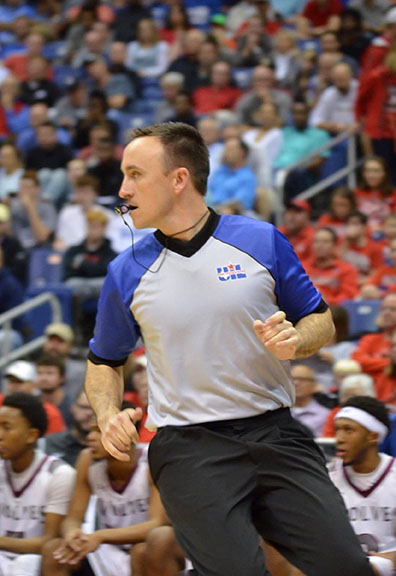
After only five years as a high school and college basketball referee, Fredericksburg resident Jeffrey Wanek has officiated at the Texas state tournament. Courtesy photo
Aug 2, 2017–When it comes to whistles, Jeffrey Wanek would rather overblow than suck.
Wanek is a basketball referee. The Fredericksburg High School and Texas Lutheran graduate is in his sixth year officiating games at the high school level and for college Division II, Division III, and junior college.
“If you have to lean one way, you do overblowing,” Wanek said. “If you don’t use your whistle enough, things can get out of hand. It’s better that you let parents, players, and coaches know you are present. There is more stoppage in play, and tempers go down.”
After only a short time visiting with Wanek, I began to form a picture that refereeing is kind of like being a conductor–but the conductor is also playing an instrument and running back and forth across the stage for two hours while the audience and performers scream at him. It’s a challenge suited to Wanek, who also works as an assistant principal, where he gets ample practice handling conflict.
During the course of typical game, an official makes thousands of decisions. And the open secret is that those decisions don’t always strictly follow “the rules.”
“The rulebook is one thing,” Wanek explained. “The interpretation of the rule is what a lot of people don’t understand. What separates the average official from the extraordinary official is how you interpret gray areas.”
A good example is “three seconds in the lane.”
“What was the purpose of the rule? To get a big person out of the paint,” Wanek said. “If a middle school player has one foot in the top corner of the lane for five seconds, if it’s not affecting play, I’m probably not going to call it.”
On the other hand, when a game seems to be getting out of hand, he doesn’t hesitate to go to the whistle. His job is to encourage a fair, safe, fun event. But rather than a loud blast, Wanek prefers the whispered word.
“I love it when coaches question a call,” he said. “I understand the coaches have a job, and that their success determines if they have a job the next year.”
For players, his preferred strategy is to get them on his side.
“If a kid is getting out of hand, I’ll say, you can keep doing this, but your team needs you on the floor,” he said. “No one else saw that interaction, but you have just changed that kid’s perspective. He may be having more playing time because of you, and you made it a better game.”
If the gym is Wanek’s stage, the whistle is his instrument. He packs an impressive assortment.

Referee Jeffrey Wanek dips into his bag of whistles when calling different levels of basketball games. Photo by Phil Houseal
“Yeah, I have more than enough whistles,” he admitted as he unrolled a pack of a dozen. “I have a whistle for every game.”
- When officiating in college, he uses an official Great Southwest Officials Association (GSOA) whistle.
“If I’m doing a college game, this whistle should be in my mouth. It looks better.” - When he worked the Texas State Tournament, he used a whistle with the Texas High School Basketball Officials Association (THSBOA) logo on the side.
“I was on TV a lot.” - Another whistle he carries is 5 decibels louder than the Fox 40 Classic. He uses that one for games at large high schools.
“If you are going into a 6A game, the crowd can be so loud the players can’t hear your whistle. With this, I know everyone is going to hear my whistles.” - For girls’ games or during breast cancer awareness month, he pulls out a pink whistle.
“It’s fun and different.” - Some whistles sound different. Those are useful at camp settings where three games may be going on in adjacent courts.
“These have a little different tone so I’m not interrupting the game next to me.” - When calling a lot of contests, he can switch to a whistle with a lower tone, “so I don’t get a headache.”
- Some have rubber guards, some don’t. Makes no difference to Wanek.
“I usually end up chewing it off,” he said.
Wanek also always carries extra whistles to games. He keeps an unopened whistle in his bag, “in case another official forgets their whistle.” And he always keeps a “mini whistle” in his pocket, “in case my whistle falls, or cracks, whatever.”
As to that crowd hounding him every step up and down the court? If you are one of those who work the ref from the stands, you might as well save your breath.
“To be completely honest? I don’t hear them,” he said. “It turns into a roar; it’s like there’s a bubble around the court.”
Even if he did hear, he would not react.
“What happens when any official engages with someone in the crowd? Does anything positive ever happen from that? I will never do that. I don’t even make eye contact with anyone in the stands.”
So, has he ever called the perfect game?
“Sometimes you mess things up and you have to admit it–but not too many times or your credibility goes down. If I mess up, I go to the kid or coach–whoever is hotter–and let them know. I say, ‘Look, you know you haven’t coached or played the perfect game, and you admit you may have missed the call. The big thing is communication.”
With all the travel, stress, and pressure, why does Wanek keep doing it? It’s not for the money. It’s not for adulation. After all, every game he makes half the people there unhappy.
“I do it for the kiddos,” he said. “I hate when the officials take a game away from the kids.”